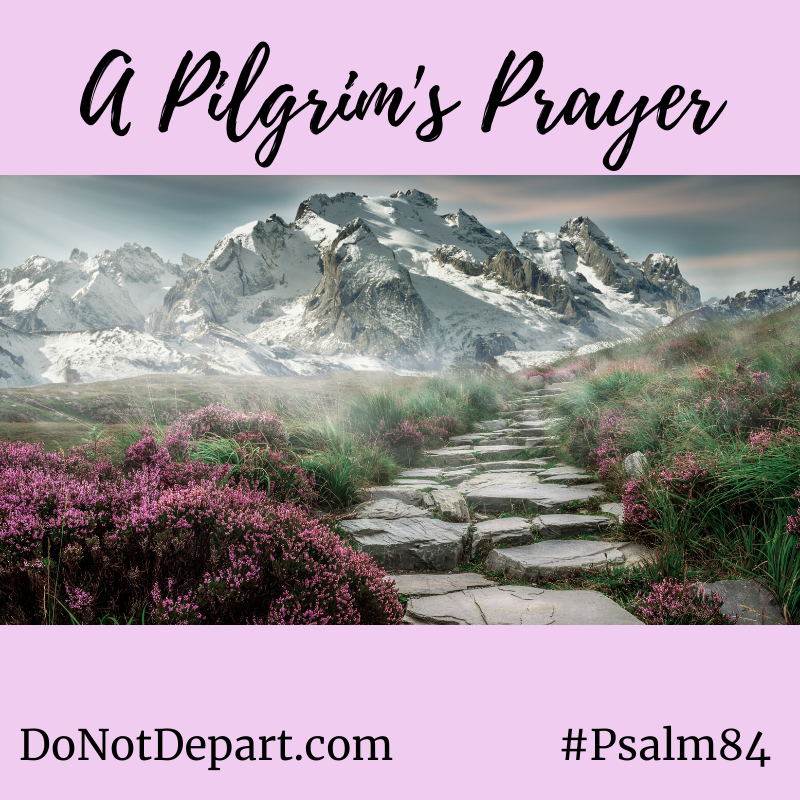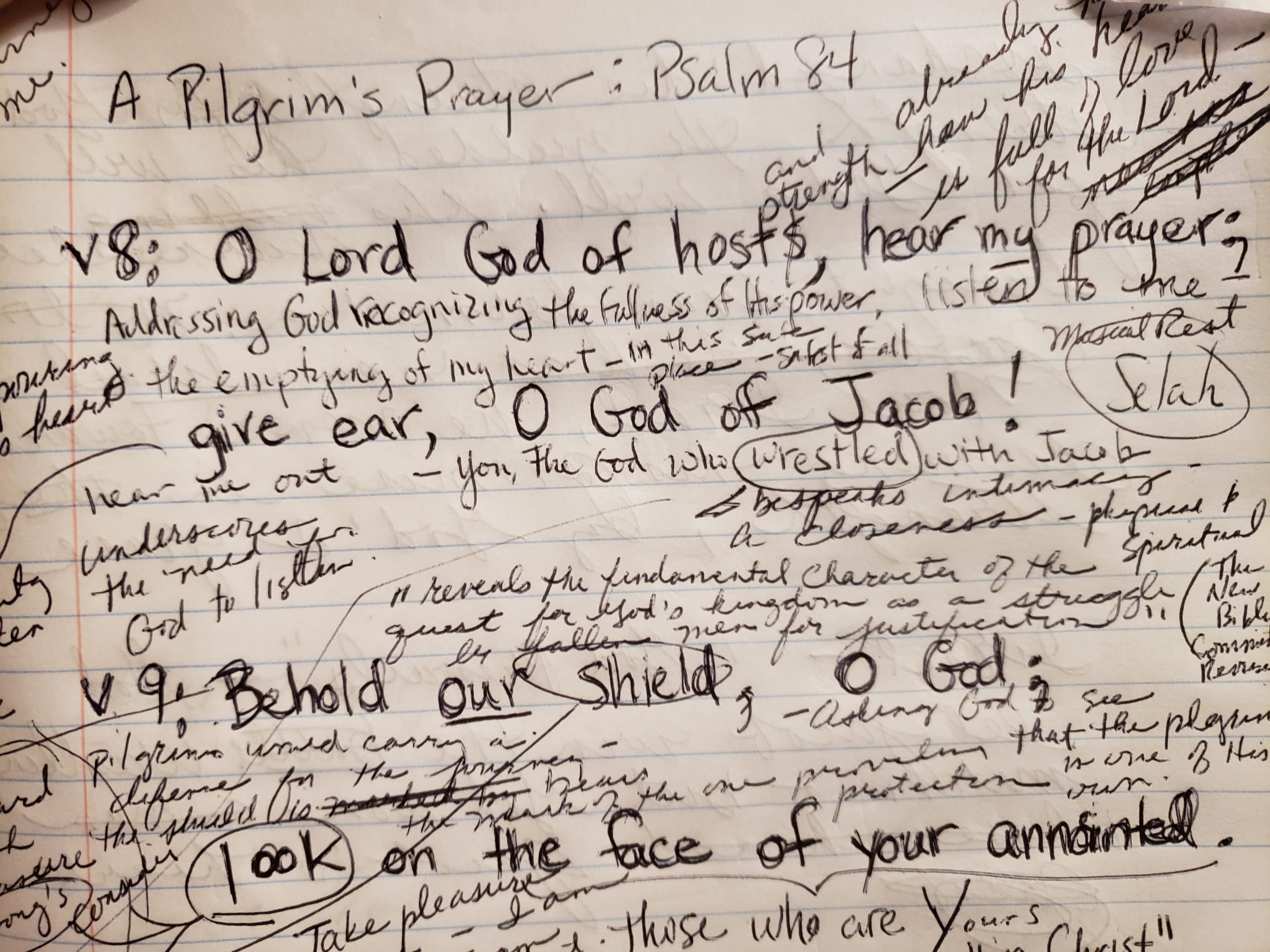A pilgrim’s song, Psalm 84, is sung by one attuned to God’s Word as he journeys closer and closer to the heart of God. The journey of the psalmist is joyful, even amidst dangers and difficulties. Because of his delight in the Lord, the pilgrim psalmist pursues dwelling with God because that is his heart’s home. Augustine of Hippo echoes the words of the psalmist,
You move us to delight in praising You; for You have made us for Yourself, and our hearts are restless until they rest in You. —from Confessions by Augustine of Hippo
Last week, Lisa walked us through the middle of the pilgrim’s journey, where things proved more difficult than at the start of his pilgrimage. She provided excellent strategies for “staying strong in the middle.” It is at the end of this “middle” section the psalmist turns to the Lord in prayer.
O Lord God of hosts, hear my prayer;
give ear, O God of Jacob! Selah
Behold our shield, O God;
look on the face of your anointed! Psalm 84:8-9
Join me as I journey through these verses. Let’s uncover what the psalmist says phrase by phrase.
O Lord God of hosts…
The pilgrim psalmist’s prayer is a bold supplication, invoking Almighty God who rules over heaven and earth. In the safest place possible is the Believer who places herself/himself in the hands of God according to the fullness of His power and strength.
Hear my prayer; give ear…
Before God’s throne in prayer, the song writer petitions God to hear him— to hear his heart outpoured. He deeply needs God to listen to him. The added emphasis, “give ear,” underscores the depth of the psalmist’s need.
Friend, God wants to hear your prayer. He loves it when you share it all. He is always ready to listen to you. He’ll never grow tired of hearing what is on your mind and heart. Your words are safe with Him.
O God of Jacob!
Powerless, weak, and right where God wanted him, Jacob did not stand a chance of winning a wrestling match with God (read Genesis 32). Grappling with God, Jacob learned what the apostle Paul preaches in 2 Corinthians 12:9-10:
But he [The Lord] said to me, “My grace is sufficient for you, for my power is made perfect in weakness.” Therefore I will boast all the more gladly of my weaknesses, so that the power of Christ may rest upon me. For the sake of Christ, then, I am content with weaknesses, insults, hardships, persecutions, and calamities. For when I am weak, then I am strong.
By His grace, God let Jacob win the wrestling match, but God won the man. Jacob surrendered his will to God and exchanged his strength for God’s strength. Jacob is justified by faith that God will secure the promised inheritance.
In calling on the God of Jacob, I believe the psalmist’s prayer is an admission of weakness and a petition to God for His strength. Strength to move beyond “the middle.” Strength to find joy in all circumstances. Strength to remain faithful to the end.
Do you need God’s strength today? Consider making Paul’s prayer your own. Invite God to replace your weakness with His strength.
Selah
The depth of the prayer requires a rest here. Take a moment to pause and consider who God is and what He has done. A link to Rich Mullins’ version of Fanny Crosby’s, All The Way My Savior Leads Me is provided here for your encouragement.
Behold our shield, O God…
As the psalmist’s prayer continues, he asks God for His favor by virtue of the character of the king the psalmist serves. Historically, a shield bore the emblem of the sovereign it served. Throughout scripture God describes himself as Israel’s shield. God says to Abram, “I am your shield” (Genesis 15:1).
Since God is our shield, it follows that He is our Sovereign and we are His people. The psalmist is asking God to look favorably on His children. When God sees me, I want Him to see that my shield bears the cross of His Son. Certainly, God’s unmerited favor grants us grace for each day and hope for the journey ahead.
Consider using a concordance or a Bible app search to see what God says about being our shield.
Look on the face of your anointed.
According to Strong’s Hebrew Lexicon, “look” can be translated as “regard with favor.” The word “anointed” refers to the king whom the psalmist served. So, after asking for God’s favor on His people, the pilgrim prays for his king. Certainly, we need to pray that our political leaders would know God’s wisdom, grace and mercy.
Considering this more deeply, I know the word “anointed” also refers to the Messiah. When I approach God’s throne in prayer, I desperately need Him to see Jesus, my mediator. Jesus secures my standing with God. In Christ, my hope is secure.
Strength to Journey On
Having faced difficulties in prayer and sought the Lord’s strength, the psalmist is ready to continue on his pilgrimage. Taking courage from faith and buoyed by our hope in Christ, may we be steadfast pilgrims until at last we are at rest in Him.



[…] We examined verses 8-9 and found a “pilgrim’s prayer.” Cheli told us, “A pilgrim’s song, Psalm 84, is sung by one attuned to God’s Word as he journeys closer and closer to the heart of God. The journey of the psalmist is joyful, even amidst dangers and difficulties. …Taking courage from faith and buoyed by our hope in Christ, may we be steadfast pilgrims until at last we are at rest in Him.” […]